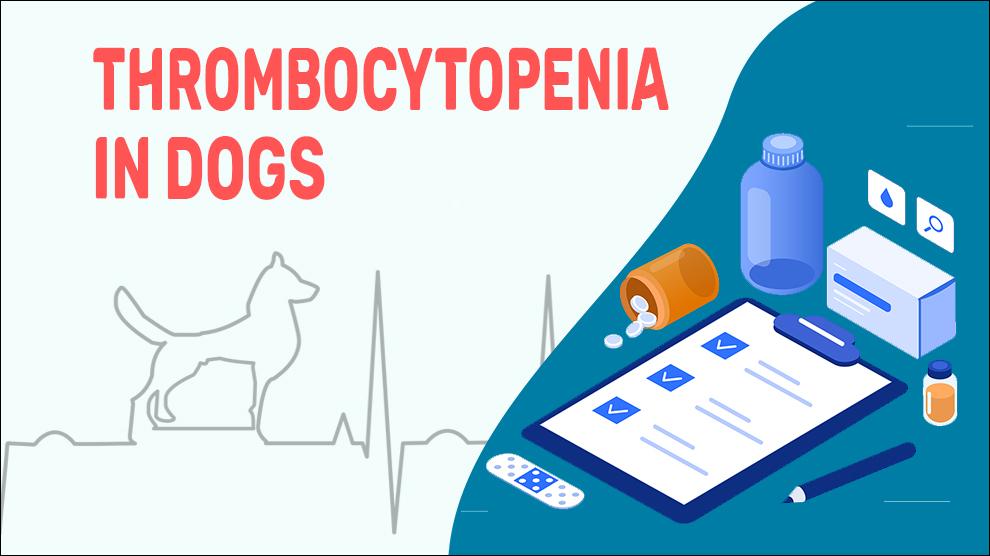What Is Thrombocytopenia In Dogs?
Thrombocytopenia is a condition of low blood platelets and it is a common reason for canine surface hemorrhage. Thrombocytopenia is quite a common condition in dogs and as many as 5% of all dogs that visit veterinary clinics are identified with low platelet count.
This can be an outcome of higher platelet destruction and utilization, splenomegaly (appropriation of platelets), and impaired thrombopoiesis. Decreased platelet production may be a one-off incident or linked with overall reduced hematopoiesis due to infections (canine distemper), myelophthisis (myeloma, leukemia, myelofibrosis), and many drug reactions (chemotherapeutics, estrogens, azathioprine) but often remains immune-mediated (idiopathic).
Increased destruction of platelets is usually related to immune-mediated thrombocytopenia (IMT), but accelerated platelet utilization may also be identified with disseminated intravascular coagulation (DIC), neoplasia, and vasculitis. Immune-mediated conditions can be divided into idiopathic thrombocytopenia purpura (ITP) (also called primary IMT) and secondary IMTs are triggered by cancer, infections (Rickettsia, Babesia, Ehrlichia spp., vaccines) and drugs.
For successful blood clotting, an intricate sequence of enzyme reactions is involved with proper coagulation factors, a number of platelets, and vasoconstriction factors. If there is a malfunction in one of these reactions during an injury, it can cause unmitigated hemorrhage and eventually leads to blood loss anemia.
The ability of the blood to clot gets decreased in a Thrombocytopenia dog and can lead to uncontrolled bleeding or spontaneous bruising, while some dogs don't exhibit any symptoms at all. The thrombocytopenia condition can be mild to severe, however, most dogs lead normal lives with treatment.
Symptoms Of Thrombocytopenia In Dogs
- Prolonged bleeding from ordinary cuts or dental work
- Spontaneous bleeding
- Epistaxis (Nosebleeds)
- Redness or discoloration of the skin
- Unrelenting, painful headaches
- Swelling/Excessive bruising
- Vision problems, such as double vision
- Blood in the urine(hematuria) or stool(Hematochezia)
- Extreme fatigue
- Nausea and vomiting
- Sudden pain and/or swelling in joints or muscles
Treatment Options For Thrombocytopenia In Dogs
The course of treatment will depend on the type of underlying disease
Blood clotting disorder's initial treatment may include plasma transfusions or medications
Vitamin K deficiency- parenteral (SQ) injection, phytonadione injections, or Vitamin K1 (Merck, Aquamephyton, Dohme, Sharp)
Inherited thrombocytopenia disorders require long-term treatment; on the other hand, acquired thrombocytopenia requires proper diagnosis and treatment of the underlying cause itself
Dogs with blood loss from a single site: for e.g. Epistaxis will be stopped by packing with icepack/gauze
Dogs with decreased platelet count: platelet transfusion (or blood components)
Immune-mediated diseases: Immunosuppressive medications to suppress the immune system
Home Remedies For Thrombocytopenia In Dogs
Always check with vets for any home remedies specific to your dog’s situation.
How To Prevent Thrombocytopenia In Dogs?
Thrombocytopenia due to hereditary abnormality can be prevented by weeding out the affected dogs so that the risk of passing the condition on to the next generation is averted.
Affected Dog Breeds Of Thrombocytopenia
Basset Hound, Doberman Pinscher, German Shepherd, Golden Retriever, Miniature Schnauzer, Scottish Terrier, Shetland Sheepdog, Standard Poodle, Pembroke Welsh Corgi
Causes And Types For Thrombocytopenia In Dogs
1. Causes:
- Infectious diseases: canine distemper, canine infectious hepatitis virus, parvovirus, leptospirosis, salmonella, heartworm disease, and many tick-borne diseases (e.g., Lyme disease)
- immune-mediated diseases (e.g., Immune-mediated hemolytic anemia, immune-mediated thrombocytopenia)
- cancers (e.g., leukemia, hemangiosarcoma, lymphoma)
- Medications include estrogen, phenobarbital (Solfoton, Barbita, Luminal), phenylbutazone (VetriBute, Butatron, Butazolidin), fenbendazole (Safe-Guard, Panacur), ACE inhibitors, sulfa antibiotics, cephalosporin antibiotics, etc
- toxins and venoms (e.g., arsenic, benzene, zinc, rattlesnake bites)
2. Types:
Congenital Thrombocytopenia:This type of disorder is immune-mediated and found in the animals by birth itself such as hereditary macrothrombocytopenia.
Acquired defects: This type of thrombocytopenia is most commonly associated with kidney or liver disease and infections.
3. Mortality:
Thrombocytopenia incidence is rather common. Almost 10 to 15% of dogs of IMT dogs die or are euthanized after a recurrence of their signs.
4. Diagnosis:
- Complete blood count/ Serum biochemical study
- Fecal analysis, urinalysis
- Platelet count
- Coagulation function
- Flow cytometry
- Clot retraction
- Smear evaluation
5. Prognosis:
This depends on the dog’s underlying disease. The prognosis for recovery of acute thrombocytopenia is guarded and in chronic cases, the prognosis depends on the affected organs and overall health of the dog.
When To See A Vet For Thrombocytopenia In Dogs?
Time to visit the vet clinic for an examination, if you notice any of the following:
- Prolonged bleeding from ordinary cuts or dental work
- Spontaneous bleeding
- Epistaxis (Nosebleeds)
- Redness or discoloration of the skin
Food Suggestions For Thrombocytopenia In Dogs
- Easily digestible lean cuts of meat, Ground meat- labeled 90 percent lean or leaner(beef, chicken, turkey)
- Brown rice with lukewarm chicken soup and cooked vegetables
- Easy-to-digest fatty proteins: Chicken breast (skinless), white meat (skinless) and thigh meat (skinless), Organ meats(liver), etc
- “Round or loin” cuts of pork/ beef (top loin, top sirloin, top round, pork tenderloin, bottom round steak)
- Vitamin K supplements: Cabbage, egg yolks, liver(raw or cooked), parsley, etc
Conclusion
Treatment and subsequent prognosis will vary depending on the specific underlying defect of the dog.
Congenital conditions may need lifelong management and often cannot be “cured.”
The clinical signs acquired due to most of the underlying conditions (save for malignancies and a few other chronic conditions) can be controlled by proper treatment. Within a month of starting the proper treatment, most of the acquired thrombocytopenia symptoms will be relieved.

















